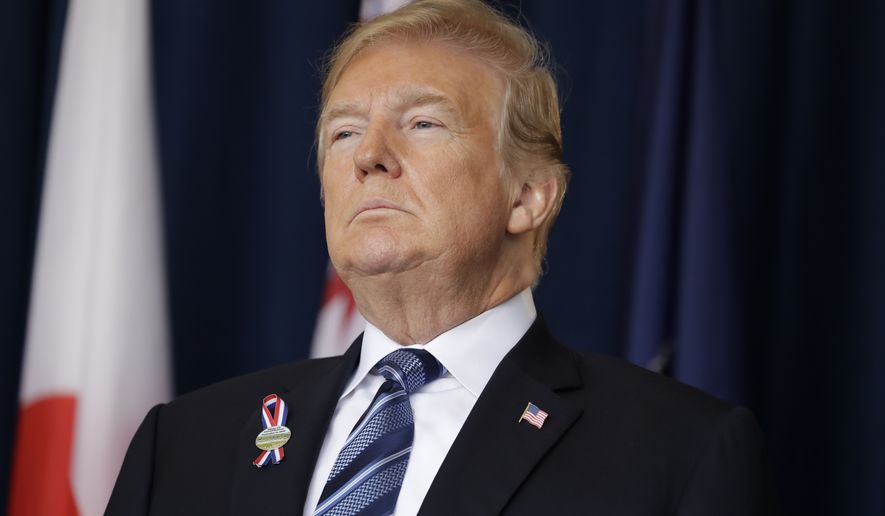President Trump moved Wednesday to deter foreign countries or people from meddling in U.S. elections, creating a mechanism to automatically impose sanctions when intelligence agencies detect cyberattacks.
But the executive order, which coincided with heightened alerts about potential attacks on the Nov. 6 elections, didn’t satisfy critics who don’t trust Mr. Trump to punish Russian hackers.
Sanctions such as freezing assets, restricting foreign exchange transactions and blocking access to U.S. financial institutions will be triggered by incursions on election systems, political parties and candidates, or for circulating propaganda, said National Security Adviser John R. Bolton.
“We felt it was important to show the president has taken command of this issue, that it is something he cares deeply about, that the integrity of our elections [and] our constitutional process are a top priority,” said Mr. Bolton, who briefed reporters on the executive order.
The order served as a warning to foreign governments contemplating cyberstrikes on America’s elections and campaigns, said Director of National Intelligence Daniel Coats, who also briefed reporters.
“It’s more than Russia,” he said, noting potential threats from China, North Korea and Iran.
“We have not seen the intensity of what happened in 2016, but as I have said … it is only a keyboard click away,” Mr. Coats said.
The order pushes back on criticism that Mr. Trump has been soft on Russian President Vladimir Putin and Moscow’s interference in the 2016 presidential election.
It also gets in front of legislation in the House and Senate that targets election hacks. Some bills would take the president out of the process for automatic sanctions and include more penalties on Russia.
The administration is ready to work with Congress on a sanctions law, Mr. Bolton said, but the White House wants to move fast.
“You never know how long legislation will take,” he said. “The president has acted decisively today.”
Mr. Trump suffered harsh criticism from Republicans and Democrats for accepting Mr. Putin’s denials when the two leaders met at a July summit in Helsinki.
The president appeared to side with Mr. Putin and against U.S. intelligence agencies that said the Kremlin meddled in 2016 to sow division, hurt Democrat Hillary Clinton and help Mr. Trump.
Mr. Trump later said he misspoke and vouched for intelligence agencies’ findings.
Mr. Bolton said the president made clear his support for U.S. spy agencies, imposed sanctions on Russia and took other actions such as the executive order.
“I think his actions speak for themselves,” he said.
Christopher Swift, a national security professor at Georgetown University and a lawyer specializing in Russian sanctions, called the executive order an “encouraging development” from a president he thinks pulls his punches on Russia.
Automatic sanctions should act as a deterrent, he said, although he added a major caveat.
“The White House has oversight. So if the White House doesn’t like something for some reason or wants to drag its feet or there’s not enough information from the available intelligence, the automatic nature of this might not be as automatic as the executive order suggests,” he said.
Under the order, intelligence agencies, led by the director of national intelligence, would assess attacks and forward findings to the Justice and Homeland Security departments.
Justice and Homeland Security would have 45 days to make a determination and notify the president to trigger the sanctions.
The Treasury and State departments also would be advised of the election attack and would be able to impose additional sanctions.
Sen. Thom Tillis, North Carolina Republican, applauded the order. He called it a necessary response to Russia’s “hostile acts against America’s democratic system that were designed to cause division and discord within our nation.”
“It is imperative that America remains united in punishing potential election meddlers and bad actors and that Republicans and Democrats work together to protect the integrity of our elections,” he said.
But the order received a lukewarm reception from bipartisan lawmakers pushing for a new sanctions law.
“Today’s announcement by the administration recognizes the threat but does not go far enough to address it,” Sen. Marco Rubio, Florida Republican, and Sen. Chris Van Hollen, Maryland Democrat, said in a joint statement.
The senators prefer their legislation, the Defending Elections from Threats by Establishing Redlines, or DETER Act. It would set up automatic sanctions that take effect without White House oversight and at the discretion of the director of national security.
The bill also would prescribe harsher penalties for Russia.
“We must make sure Vladimir Putin’s Russia, or any other foreign actor, understands that we will respond decisively and impose punishing consequences against those who interfere in our democracy,” they said.
Sen. Mark R. Warner, Virginia Republican and vice chairman of the Senate Select Committee on Intelligence, said the order gave too much discretion to the president.
He said Mr. Trump has demonstrated that he won’t stand up to Mr. Putin.
“If we are going to actually deter Russia and others from interfering in our elections in the future, we need to spell out strong, clear consequences, without ambiguity,” Mr. Warner said. “We remain woefully underprepared to secure the upcoming elections, and an executive order is simply no substitute for congressional action.”
Mr. Warner also called for passage of the DETER Act, which he co-sponsored.
Mr. Swift cautioned against the bill, which he said could infringe on the president’s constitutional powers and would put authority in the hands of an unelected official.
While not a fan of Mr. Trump, he said the issue was bigger than the occupant of the White House.
“I would veto that bill in order to protect presidential power. I’d say the same thing if [Barack] Obama was president,” Mr. Swift said.
Mr. Coats said intelligence agencies were working around the clock to protect the midterm elections.
“This is an ongoing effort here, and it has been for a significant amount of time,” he said.
• S.A. Miller can be reached at smiller@washingtontimes.com.




Please read our comment policy before commenting.